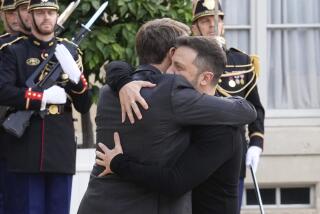Yeltsin Vows to Foil Forces Bent on a Coup
- Share via
LONDON — Russian President Boris N. Yeltsin said Tuesday that forces that might seek to oust him are at work in Russia--but he warned that he is prepared to use his emergency powers to prevent any right-wing coup.
“We must directly recognize (that) there are in our country forces interested in a revanchist coup,” Yeltsin said in a speech to Parliament on the last day of his official visit to Britain.
But the Russian president insisted that his government will not allow a successful “reaction” by potential coup plotters, whom he identified as members of the old Communist Party, the state elite, old-fashioned economic managers, militant nationalists and “political adventurists.”
“All these forces have come to life in recent times,” Yeltsin said. “They are trying to switch to open, massed attack, speculating on the difficulties which the people are experiencing. But I am convinced such plans are not destined to be fulfilled.”
Yeltsin, the first non-Western leader invited to address both houses of Parliament, received a standing ovation from 500 or so members of the House of Commons and the House of Lords when he said a new era of friendship exists between Russia and Britain. His audience included Prime Minister John Major; Margaret Thatcher, the former prime minister, and other British political leaders.
Yeltsin accused the conspirators in his country of “whipping up emotion in the calmer climate that now prevails in Russia.” But he insisted that his opponents “are just a shadow theater where the phantoms of the past are giving their final performance.”
Yeltsin said that to thwart any possible coup, “I shall use the power granted to me by the people.”
On Dec. 1, Yeltsin faces a tough session of the conservative-oriented Congress of People’s Deputies, which may try to unseat him by citing his failure to solve Russia’s immense economic problems.
Yeltsin said he would not allow opponents to reverse reforms that he has introduced since becoming his nation’s first democratically elected president in June, 1991, and he promised to press ahead with his liberalized economic policies--despite the hardships they cause. “There is no alternative to them,” he argued. “Despite the hysterics of the opponents of reforms, Russia will not stop and will not turn back.”
And he insisted: “We are in control of the situation in Russia, and we shall not allow the reactionary forces to stage a comeback.”
Speaking through an interpreter, Yeltsin appealed to members of the British Parliament to support his effort to defend the rights of Russian minorities in other former Soviet republics. In an apparent reference to Estonia and Latvia, which have imposed language and other requirements for citizenship, he condemned attempts to turn Russians into “second-class citizens.”
He also defended his action in sending troops to quell ethnic unrest in southern Russia, declaring, “Timidity and delay in taking decisions lead to chaos and turn against the peaceful population.”
Discussing arms control, Yeltsin said that Russia’s moratorium on nuclear testing--in force until next July--”can be further extended if there are the corresponding conditions,” which diplomats took to mean that a ban would be possible if other nuclear powers agreed to it.
Yeltsin confirmed a shift in the Russian position, away from total abolition of nuclear arms and toward nuclear deterrence.
In an obvious comment on statements made by President Bush during his recent campaign, Yeltsin also asked Western politicians to refrain from claiming Western victory in the Cold War.
The winners of the Cold War, he said, are all those who opposed totalitarianism and sought to promote democracy: “The whole of humanity is the victor; it is our common victory.”
Earlier, Yeltsin had what was called a “very warm, cordial and constructive meeting” with opposition Labor Party leader John Smith, who expressed strong support for the reform program and movement toward full democracy in Russia. Yeltsin has been seeking increased British investment for Russia and has offered lower taxes and higher profits for those who respond. He has also promised to reduce the $70-billion Soviet debt.
Yeltsin and his wife lunched at Buckingham Palace with Queen Elizabeth II and Prince Philip. At lunch, Yeltsin invited the queen to visit Russia. The offer was accepted in principle, but diplomats said a visit is unlikely to occur until the political and economic situation in Russia has settled down.
More to Read
Sign up for Essential California
The most important California stories and recommendations in your inbox every morning.
You may occasionally receive promotional content from the Los Angeles Times.












